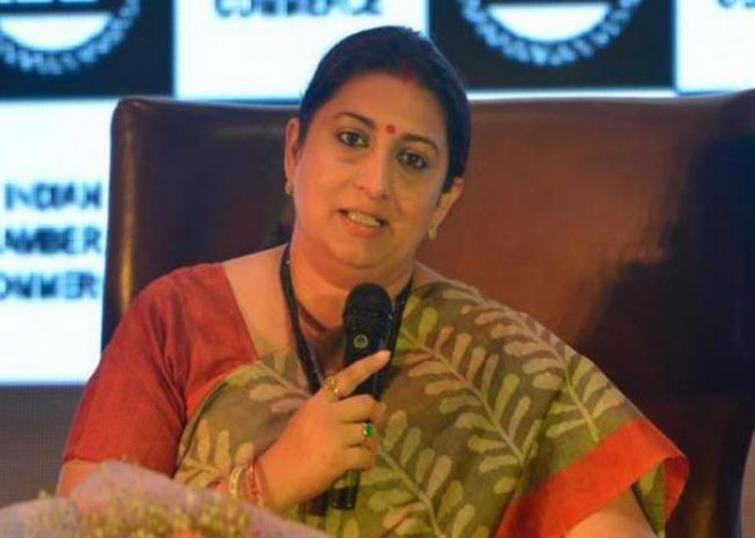 Smriti Irani
Smriti Irani Textiles Ministry working on structure to roll out PLI Scheme for technical textiles & manmade fibre: Smriti Irani
Kolkata/IBNS: The Textiles Ministry is bringing to form a structure under which the Production Linked Incentive (PLI) Scheme for technical textiles and manmade fibre (MMF) segment will be rolled out, Union Cabinet Minister Smriti Irani said at an ASSOCHAM Foundation Week Programme on Friday.
“We are currently on the anvil of also bringing to the fore the new Indian textile policy, the last time India had a textile policy was two decades ago,” said the Textile Minister while virtually addressing.
Highlighting the impact of agricultural reforms on Indian industry, she said, “The Government of India in a determined effort has ensured that the MSP operations undergo with the help of technology and those who participate in the MSP operation receive direct benefit transfer of their funds into their bank accounts.”
“In 2013-14, in the cotton segment, the MSP operations were merely worth Rs 90 crore while last year the MSP operations in the cotton segment alone breached a value in total of Rs 28,500 crore. This season, I am proud to announce that in the cotton segment MSP operations worth Rs 14,659 crore have already been undertaken and 9.63 lakh farmers producing cotton in the country have directly received into their bank accounts an amount of Rs 11,799 crore, this is done in only two months.”
Addressing the ASSOCHAM event virtually She added, “This means, when we look at the policy reforms, the idea called Aatmanirbhar Bharat cannot come to a fruition when we work in silos. So while on one hand the Government of India undertakes agricultural reforms, on the other hand we leverage technology to provide farm support and undertake MSP operations.”
On the industry impact of engaging with farmers and industry on issues such as cotton, Irani said, “Today if you look at extra-long stable cotton, we currently produce only four lakh bales, looking at the agricultural reforms, if the industry conjoins its efforts with farming community and we bring up the potential growth of production of ELS cotton from four lakh bales to 50 lakh bales, then the impact on the Indian cotton textiles industry will be such that we will increase our businesses from the current $18 billion (bn) to $80 bn, that is the potential that needs to be leveraged and explored.”
Talking about agricultural reforms she underlined that when reform takes place in one segment, its impact is determined across the value chain of Indian economy.
“When agricultural reforms came into being, it was a contribution of dialogues and deliberations that have been undertaken for 19 years across industries, agriculture sector, farmer organisations and specialists who want to leverage technology in the field of agriculture so that potential benefit is accrued not only by farmers but also industry and citizens at large,” she said further.
On India becoming the second largest manufacturer and exporter of personal protective equipment (PPE), the Union Minister said, “When Covid-19 pandemic hit Indian shores, not many across the globe were confident of India’s response, today as Minister of Textiles I can say that one of the greatest examples of Indian resilience was given by the Indian textiles industry in the manufacturing of PPE suits, provision for which was among the consistent demands of frontline workers and the medical community was across the world.”
She said that while the textiles industry was not prepared for it, but rose to this challenge. “It was an effort which involved almost all ministries and industry segments in support of Indian textiles industry.”
Highlighting the fact how industry giants held hands in support of SMEs in India, she informed about how an SME apparel manufacturing company wanted to contribute to the PPE story by reorienting their manufacturing processes and make PPE suits for medical community so that they could contribute to national cause but lacked finances for machinery and other equipment and on her request, Mr Anil Agawal, Executive Chairman - Vedanta Resources Limited came forward to help them.
“So as we celebrate the fact that today India has become the second largest manufacturer and exporter of PPEs we celebrate the true Indian potential to partner with one another in times of crisis,” said Irani.
Central Government's Production Linked Incentive Scheme (PLI) to attract diversification, investment and growth in the Man-Made Fibre (MMF) and Technical Textiles segments and boost India's share in these particular segments in the global textiles market, giving the much-needed impetus to the Government’s initiatives of “Make of India” and “Atmanirbhar Bharat”.
The scheme is extended for 10 key specific sectors, of which Textile is one of the sectors and has been allocated Rs 10,683 crore of the total estimated outlay of Rs. 1.46 lakh crore, mainly for MMF and technical textile segment.”
Support Our Journalism
We cannot do without you.. your contribution supports unbiased journalism
IBNS is not driven by any ism- not wokeism, not racism, not skewed secularism, not hyper right-wing or left liberal ideals, nor by any hardline religious beliefs or hyper nationalism. We want to serve you good old objective news, as they are. We do not judge or preach. We let people decide for themselves. We only try to present factual and well-sourced news.







